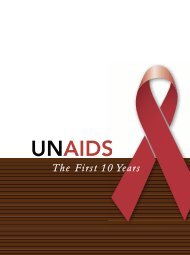Task Shifting - Global Recommendations and Guidelines - unaids
Task Shifting - Global Recommendations and Guidelines - unaids
Task Shifting - Global Recommendations and Guidelines - unaids
You also want an ePaper? Increase the reach of your titles
YUMPU automatically turns print PDFs into web optimized ePapers that Google loves.
annex 6<br />
Annex 6<br />
Definitions<br />
Accreditation Approval or formal recognition of an educational programme (or institution) by an<br />
authoritative governmental or professional body through a systematic assessment against<br />
established, explicit st<strong>and</strong>ards.<br />
Certification Evaluation <strong>and</strong> recognition of an individual by an authorized body, which may be<br />
either a governmental or nongovernmental organization, implying that the individual received<br />
additional education <strong>and</strong> training, <strong>and</strong> demonstrated competence against predetermined<br />
requirements or criteria.<br />
Community health worker A health worker who has received training that is outside the nursing<br />
<strong>and</strong> midwifery medical curricula but is, nevertheless, st<strong>and</strong>ardized <strong>and</strong> nationally endorsed. This<br />
category can include health workers with a range of different roles <strong>and</strong> competencies <strong>and</strong> those<br />
that are providing essential services in a health facility, or in the community as part of, or linked to,<br />
a health team at a facility.<br />
Competencies Knowledge, underst<strong>and</strong>ing, skills <strong>and</strong> attitudes that an individual develops or<br />
acquires through education, training <strong>and</strong> work experience, which can be used to describe<br />
particular occupational roles or functions against which individual performance may be assessed.<br />
Expert patient A person living with a long-term health condition who is able to take more control<br />
over his or her health by underst<strong>and</strong>ing <strong>and</strong> managing his or her condition, leading to an<br />
improved quality of life. Becoming an expert patient is empowering for people with chronic<br />
conditions. Expert patients can also use the skills <strong>and</strong> knowledge they have acquired to support<br />
peers.<br />
HIV burden Estimates for global or national incidence, prevalence, disability <strong>and</strong> mortality due to<br />
HIV/AIDS derived from the global burden of diseases (GBD). The GBD uses a summary measure<br />
– the disability-adjusted life year (DALY) – to quantify the burden of disease. DALYs for a disease<br />
are the sum of the years of life lost due to premature mortality (YLL) in the population <strong>and</strong> the<br />
years lost due to disability (YLD) for incident cases of the health condition.<br />
Human resources for health All people engaged in actions whose primary intent is to enhance<br />
health. Included are those who promote <strong>and</strong> preserve health as well as those who diagnose <strong>and</strong><br />
treat disease. Also included are health management <strong>and</strong> support workers – those who help make<br />
the health system function but who do not provide health services directly.<br />
HIV services A package of clinical services including HIV prevention, care, treatment <strong>and</strong><br />
support.<br />
Medical doctor A legally qualified <strong>and</strong> licensed practitioner of medicine, concerned with<br />
maintaining or restoring human health through the study, diagnosis <strong>and</strong> treatment of disease <strong>and</strong><br />
injury, through the science of medicine <strong>and</strong> the applied practice of that science. A medical doctor<br />
requires training in a medical school. Depending on jurisdiction <strong>and</strong> university, these may be<br />
either undergraduate-entry or graduate-entry courses. Gaining a basic medical degree may take<br />
from five to eight or even nine years, depending on jurisdiction <strong>and</strong> university. Medical doctors<br />
include generalists <strong>and</strong> specialists. Medical training completed by internship qualifies a medical<br />
doctor to become a physician or a surgeon.<br />
Midwife Someone who is trained to assist in childbirth: includes registered midwives <strong>and</strong><br />
enrolled midwives but does not include traditional birth attendants.<br />
79

















